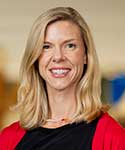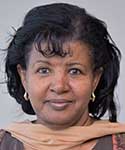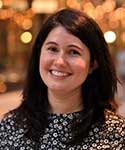ENAR 2024 Educational Program | ROUNDTABLES
Roundtables are conversations centered around a predetermined topic and led by a discussion leader. Due to the small group size, all attendees are able to participate equally, providing a more intimate discussion than a larger scientific session. All Roundtables take place Monday, March 11 from 12:15 pm – 1:30 pm
Monday, March 11 | 12:15 pm – 1:30 pm
RT1 | Advancing Rare Disease Research
Leader:
Kelley Kidwell, University of Michigan
Description:
While so many statisticians are focusing on big data, we are still not sure how to do our best with small data. There are over 7,000 rare diseases affecting 1 in 10 Americans, with more than 90% of those rare diseases lacking approved treatments. This roundtable hopes to combine minds across all sectors to brainstorm and discuss best practices and innovation to improve treatment for small samples, focusing on the challenges of and opportunities in rare disease clinical trial design and analyses. This area is ripe for innovation, so bring the problems you've faced in collaboration, innovative ideas, and knowledge of practical constraints so we can have a fruitful discussion. Side effects of this roundtable include potential collaborations!
Leader Bio:

Kelley M. Kidwell is a Professor and the Associate Chair of Academic Affairs of Biostatistics at the University of Michigan (UM) with extensive experience in the design and analysis of clinical trials. Her particular expertise is in sequential, multiple assignment, randomized trials (SMARTs) and more novel trial designs. She has been the principal investigator of two Patient Centered Outcomes Research Initiative (PCORI)-funded contracts developing methods for SMARTs applied to rare diseases and incorporating patient preferences, and a Food and Drug Administration (FDA) Broad Agency Announcement contract developing design and methods for small sample SMART designs and is on the Clinical Trial Advisory Board of PCORI.
Monday, March 11 | 12:15 pm – 1:30 pm
RT2 | Funding at the National Institutes of Health (NIH): Grants, Summer Programs, and Special Notices
Leader:
Misrak Gezmu, National Institute of Allergy and Infectious Diseases, NIH
Description:
In this round table discussion, I will cover grant application processes and funding opportunities at NIH. The discussion will focus on grants, summer programs and special notices that are of current interest to NIH centers and institutes. The discussion will include on how to navigate through NIH website to find funding opportunities that are of interest to your research areas, submitting application through solicited or unsolicited funding opportunities and finding information that are helpful in writing your grant application. Examples will be provided from NIAID statistical methods grants.
Leader Bio:

Dr. Gezmu is currently a Program Official for Statistical Methods grants in infectious diseases research at the Division of Clinical Research, National Institute of Allergy and Infectious Diseases (NIAID), National Institutes of Health (NIH). She earned her Ph.D. in Mathematical Statistics in 1996 from the Department of Statistics, American University in Washington DC. Prior to joining NIAID, she was an assistant professor in the Decision Sciences Department, at Norfolk State University in Virginia. She joined NIAID in 1998. In her capacity as a Program Official, she informs the statistical community about the current research area of the institute, gives advice in submitting grant applications and discusses the next steps after their grant is reviewed. She is highly dedicated to increasing the biostatistical work force to address the growing demand of biostatisticians in biomedical research nationally and internationally. Dr. Gezmu is an elected Fellow of the American Statistical Association.
Monday, March 11 | 12:15 pm – 1:30 pm
RT3 | Best Practices for Building an Effective Statistical Consulting Center
Leader:
Jesse Chittams, University of Pennsylvania
Description:
This topic will address best practices for 1) training and retaining a highly proficient team of statisticians, data managers, and student interns; 2) implementing a detailed and efficient set of standard operating procedures allowing you to juggle dozens of projects simultaneously and even pick up a dormant project right where you left off; and 3) implementing an effective project tracking system that allows you to register each project and track estimated vs actual hours committed each day. 4) Fee-for-service vs. Percent Effort Contracts. 5) Identifying partners to help build an effective team.
Leader Bios:

Jesse Chittams, is a Senior Level Data Scientist with over 30 years of experience developing Biostatistics Consulting Centers within a number of institutions. He has helped establish Statistical Consulting Centers at the University of Pennsylvania, Drexel, Jefferson, Emory, and Rutgers University as well as, within NIH and USDA. He has served as the Managing Director of the Biostatistics Consulting Center the University of Pennsylvania School of Medicine and Nursing, and Director of the Statistical Consulting Center for Drexel University, where he collaborated on numerous projects and over 100 publications. His collaborative projects involve alcohol addiction, autism, pediatrics, olfactory disorders, oncology, geriatrics, radiology, OB/GYN, eating disorders, and cardiology. His areas of expertise include, randomized clinical trials, and longitudinal data analysis.
Monday, March 11 | 12:15 pm – 1:30 pm
RT4 | Inclusive Leadership in Industry
Leader:
Brian A. Millen, PhD, Biogen
Description:
It’s well-known and accepted that diverse teams outperform their peers. Nonetheless, many leaders adopt a one-size-fits-all approach to developing and evaluating talent. While simple for the leader, the results of this approach are suboptimal. In this roundtable, we’ll explore successful approaches which mentors and leaders may employ to leverage differences (in backgrounds, skills, experiences, and passions) among team members to deliver high performance and employee engagement. Please come ready to share your experiences and learnings in leading and mentoring collaborative statisticians for success in industry.
Leader Bio:

Brian A. Millen is Vice President, Global Head of Biostatistics, Epidemiology, and Real-World Data Analytics at Biogen. In this role, Dr. Millen provides strategic direction to the organization and contributes to a growing data and analytics-driven culture within research and development at the company. Dr. Millen's career in the pharmaceutical industry spans more than two decades. Prior to his current role, he served at Lilly in multiple senior leadership and technical roles across the clinical development lifecycle. Dr. Millen is the 2023 Chair of the ASA Biopharmaceutical Section and a Council member of the International Biometrics Society. He holds a Ph.D. in Statistics from The Ohio State University and a B.A. in Mathematics from the University of Georgia. He is a Fellow of the American Statistical Association.
Monday, March 11 | 12:15 pm – 1:30 pm
RT5 | Current Challenges in Medical Device Regulation: A Statistical Perspective
Leader:
Yuqing (Elaine) Tang, PhD, U.S. Food and Drug Administration
Description:
The rapid advancement of technology in healthcare calls for the development and application of innovative statistical approaches in the evaluation of medical devices. In this round table, we will delve into various pressing statistical issues currently encountered in regulatory decision making, including the Estimand framework, Adjusting for Covariates in Randomized Clinical Trials, Software as a Medical Device (SaMD) developed by Artificial Intelligence (AI) and Machine Learning (ML). The discussion will be solicitating ideas from industry, regulatory, academia, to facilitate better understanding, clarity, and potential approaches to solutions for the issues under discussion.
Leader Bio:

Dr. Elaine Tang is a Team Lead in the Division of Biostatistics at the Office of Clinical Evidence and Analysis within Center for Devices and Radiological Health (CDRH). Before joining CDRH, she served as a Statistical Reviewer for dermatology and dental products at the Center for Drug Evaluation and Research (CDER). Dr. Tang earned her PhD in Mathematical Statistics from the University of Illinois at Chicago.
Monday, March 11 | 12:15 pm – 1:30 pm
RT6 | Challenges in Collecting and Evaluating Patient Reported Outcomes
Leader:
Saryet Kucukemiroglu, U.S. Food and Drug Administration
Description:
Patient-reported outcomes (PROs) are measurements used to evaluate patients’ health condition based only on patients’ perspective of their treatment. PRO measures play a prominent role when assessing whether a treatment improves the health of patients. In this roundtable, we will discuss approaches in collecting, evaluating, analyzing, and interpreting PRO data. Many standard methods can be used to analyze PROs; however, there are limitations when using these methods to assess PROs in practice. Some of these methods are not very informative for clinicians and researchers when evaluating certain research problems or clinical endpoints. In addition, the increased use of wearable medical devices in recent years have allowed researchers to collect vast amount of PRO data easily; however due to lack of standardized data collection, data analysis and interpretation of PROs have become more challenging. We plan to discuss improving methods for collecting PRO data, innovative methodologies in assessing PRO data, and challenges analyzing and interpreting PRO measures.
Leader Bio:

Dr. Saryet Kucukemiroglu is a Mathematical Statistician at the Food and Drug Administration (FDA) Center for Devices and Radiological Health (CDRH). She received dual B.S. degrees in Biostatistics and Life Science from Pennsylvania State University and her Ph.D. in Biostatistics from Florida State University. Her primary research interests include development of statistical methods for analyzing patient-reported outcome data, categorical data analyses, clinical trial designs and data analyses for medical devices, and statistical models for lifetime data.
Tuesday, March 12 | 12:15 pm – 1:30 pm
RT7 | Funding at the National Institutes of Health (NIH): Grants, Summer Programs, and Special Notices (2nd session)
Leader:
Misrak Gezmu, National Institute of Allergy and Infectious Diseases, NIH
Description:
In this round table discussion, I will cover grant application processes and funding opportunities at NIH. The discussion will focus on grants, summer programs and special notices that are of current interest to NIH centers and institutes. The discussion will include on how to navigate through NIH website to find funding opportunities that are of interest to your research areas, submitting application through solicited or unsolicited funding opportunities and finding information that are helpful in writing your grant application. Examples will be provided from NIAID statistical methods grants.
Leader Bio:

Dr. Gezmu is currently a Program Official for Statistical Methods grants in infectious diseases research at the Division of Clinical Research, National Institute of Allergy and Infectious Diseases (NIAID), National Institutes of Health (NIH). She earned her Ph.D. in Mathematical Statistics in 1996 from the Department of Statistics, American University in Washington DC. Prior to joining NIAID, she was an assistant professor in the Decision Sciences Department, at Norfolk State University in Virginia. She joined NIAID in 1998. In her capacity as a Program Official, she informs the statistical community about the current research area of the institute, gives advice in submitting grant applications and discusses the next steps after their grant is reviewed. She is highly dedicated to increasing the biostatistical work force to address the growing demand of biostatisticians in biomedical research nationally and internationally. Dr. Gezmu is an elected Fellow of the American Statistical Association.
